Who is Cain's Father? Part One
Is Adam really Cain's Father? You may understand the Bible to say Adam and Eve had sex and Cain was born of that union. That's an assumption this writing will challenge. This is important because, as I think you'll shortly see, unless you really grasp the importance of seed and what happened in the Garden between the serpent, Eve and Adam you're missing a major "piece of the puzzle." Without it, you won't be able to interpret some really important elements of the counterfeit and the genuine agendas playing out in these last days.
You're probably familiar with the classic way parents explain sexual reproduction to their children as "the birds and the bees." Another classic is the "brought by a stork" explanation for where babies come from. The story told about Adam and Eve being tricked by a snake into eating an apple from a tree is like that, a way to explain a mature subject to the immature. For the mature, there's more to be known and understood about the Garden scenario and its consequences, much more!
Some will want to argue that the sin in the Garden was disobedience and that this is really the only thing that matters. Adam was told, don't do that, but he did it anyway. My response to that is, let's not be ignorant. Consider how a disobedient child might sneak a cookie before dinner or, perhaps, they might burn the house to the ground. How should the parent respond in these cases? You see, the nature of the act of disobedience, of the command that's disobeyed, has a bearing on the response. If we're just interested in stories that entertain small children, then, fine, we can limit the point made to the matter of disobedience. If we want to gain some wisdom and understanding about sin and its consequences we're going to have to account for the nature of the command that was disobeyed and the acts of disobedience.
How can I write with confidence on this subject? Because the Lord showed me, and I know it. That was about 18 years ago, sometime in the winter of 1991/1992. I was really stunned when it happened. I really had no particular insight or special interest in this topic before the revelation came, but it came in a season where I was being prompted to ask lots of specific questions and subsequently led directly to the answers. Each answer had multiple confirmations following. After all the years since that memorable season I'm still learning what some of those answers really mean and how important they really are.
This study is not intended for children, the immature adult or casual seeker. I highly recommend before continuing here that you pause to read Genesis chapters 2-4, so the scriptural account is fresh in your mind, and, that you pray for the Lord to grant you insight according to His good pleasure. I also recommend that you read this entire study and consider the sum of the evidence before rejecting it on some point of initial disagreement. What happened in the Garden that caused man to be expelled is popularly referred to as "the original sin" but I'm not going to use that reference here.
Alternate conception and birth models
"Dizygotic (fraternal) twins arise from different eggs and sperm, look as different as siblings born at different times would look, and can be either the same or different sex. A dizygotic pregnancy does not always result from the same act of sexual intercourse, which means it is theoretically possible for dizygotic twins (as well as triplets and other higher-order pregnancies) to have different fathers."
"Multiple Pregnancies - Twins, Other Multiple Births" (formerly here: www.womenshealthchannel.com/multiple
pregnancies/multiplebirths.shtml)
"Trizygotic triplets occur when three separate eggs are fertilized by three separate sperm."
"Superfecundation refers to fertilization of two or more ova (eggs) during the SAME menstrual cycle by sperm from separate acts of sexual intercourse. Twins with different fathers are thought to arise by this mechanism."
Twinning (OBFocus)
"As technology has improved the accuracy and accessibility of genetic testing, it has become more evident that twins can have two different fathers. The situation only applies to fraternal (dizygotic) twins, not identical (monozygotic) twins, which form from a single egg/sperm combination. However, fraternal twins are the result of hyperovulation, the release of multiple eggs in a single cycle. Superfecundation describes a situation where the eggs are fertilized by sperm from separate incidences of sexual intercourse. In a case where a woman has sex with different partners, the twins could have different fathers. The appropriate term to describe this situation is heteropaternal superfecundation. "
Heteropaternal Superfecundation - Twins with Different Fathers
Superfetation
Definition: Term used to describe the formation of a fetus while another fetus is already present in the uterus. It occurs when eggs from two separate menstrual cycles are released, as opposed to normal dizygotic twins where multiple ova are expelled in a single cycle. Although common in animals, it is rare in humans, but can result in a twin or multiple pregnancy where the fetuses display a marked difference in gestational development.
Examples: In 2009, an Arkansas woman became pregnant with two babies due to superfetation. Ultrasound revealed that Julia Grovenburg was pregnant with two babies conceived about two and a half weeks apart.
Superfetation - glossary (About.com)
"An Australian woman who became pregnant twice in 10 days has given birth to twins. ...Mrs Hill fell pregnant twice because of a rare occurrence known as superfetation, with only 10 cases documented worldwide. "
Woman Gets Pregnant Twice in 10 Days in Rare Medical Case (The Telegraph - 11/16/2016)
"Among dizygotic twins, in rare cases, the eggs are fertilized at different times with two or more acts of sexual intercourse, either within one menstrual cycle (superfecundation) or, even more rarely, later on in the pregnancy (superfetation). This can lead to the possibility of a woman carrying fraternal twins with different fathers (that is, half-siblings). This phenomenon is known as heteropaternal superfecundation. One 1992 study estimates that the frequency of heteropaternal superfecundation among dizygotic twins whose parents were involved in paternity suits was approximately 2.4%; see the references section, below, for more details."
Twin - Unusual twinnings (Wikipedia)
Ready? Let's go!
The first thing that may come to mind when you read my statement that Adam did not father Cain is probably the verse that seems to declare that Adam DID father Cain. Certainly, if the Bible says so, that settles it - but what does the scripture say, and, what does it not say?
Well, that seems plain enough. When we read such a verse, if we subsequently encounter no apparent contradiction we have no reason to investigate further. However, on the subject of Cain's paternity we find ourselves having to contrive a variety of explanations when Cain's father is assumed to be Adam. Did Adam and Eve have daughters? Yes. Does the narrative give a full birth history of all their children? No. The account is really pretty sparse. I submit to you that it's just what it needs to be, and the Author freely employs means of concealing and revealing as He wills according to His purposes.
When reading verses 1 and 2 we naturally think about bringing forth children one at a time. We think, first a conception, then a birth, followed by another conception and another birth. This is our most familiar model. Is there any evidence that this was the case with Cain and Abel? Produce it if you can. I can't find any. Does verse 2 say "And Adam again knew Eve his wife, and she conceived again and bare Abel." No, it doesn't, but yet, this is how most read it due to assumptions. Verse two simply reads, "And she again bare his brother Abel."
Does the Bible indicate how much time passed between the birth of Cain and the birth of Abel? No, their relative ages are nowhere to be found in the Bible. Abel's birth could have followed Cain's by minutes, which is common with twins and multiple births. You might now assume that, if they were twins, they would still both be Adam's sons, but Adam wasn't the only one in the Garden capable of fathering children with Eve, and there are conception and birth models beyond what first comes to mind that must be considered.
You might be thinking at this point how the Author could have clarified the matter by giving a little more explanation, making it a bit less cryptic. He's either a poor author who can't communicate effectively, or a brilliant author who allows for concealing and revealing. I'm betting the latter.
With an awareness of the reality of heteropaternal superfecundation and superfetatation (see side panel), what can we reasonably conclude from Genesis 4:1-2 with regard to Cain's or Abel's paternity?
Honestly, we can only say that one or more of them was Adam's, based strictly on this passage. Was this an instance of heteropaternal superfecundation or superfetation? If the matter can be known the evidence must be sought elsewhere.
While it doesn't yet settle the matter, there's a clue we should note before we move on. Upon delivering Cain, Eve declared that she had gotten a man with (Hebrew - 'eth) the Lord (Hebrew - Yehovah). If you research the name reference that is the Hebrew word Yehovah in all the surrounding context you find an interesting feature. Prior to Eve's declaration in Genesis 4:1 the word Yehovah is always followed by the word 'elohiym, forming "Lord God" - without exception. Eve's declaration marks a change. Why? Did she profane the name with reference to a lesser god? Well, that's something to think about.
The Genealogy of Cain is Separate From the Genealogy of Adam
So, where else should we look as we search out these family relationships? There's a genealogy given for Adam in Genesis chapter 5, so let's consider what we find there.
What? Seth? What about Cain and Abel? This is obviously a pretty sparse genealogy. The phrase, "and he had other sons and daughters," doesn't offer anything in the way of help in our quest to discover Cain's paternity.
Given the usual status assigned to firstborn sons, by all rights we should expect that Cain would be first listed instead of Seth in Adam's genealogy. His omission must be noted. Cain's genealogy is given separately, before Adam's, in chapter 4. This genealogy begins with Cain, naming neither Adam nor another before him. While this is not conclusive evidence that Adam is not Cain's father, it must, at the very least, invite suspicion. If the Author intends to leave the truth of the matter for those who search it out more diligently, He is succeeding.
Items of interest
I found these in a brief search.
"What Did Abel Have That Cain Didn't?" (formerly here: www.keyway.ca/htm2003/20031114.htm)
"Abel, pronounced in the original Hebrew of the Scriptures as heh-bel, was the second-born son of Adam and Eve - but perhaps not by much. After the birth of Cain, Genesis 4:2 literally translates as "and she continued to give birth, his brother Abel.""
A Twist of Cain
"The passage "and again she bare his brother Abel," has led some Biblical scholars to speculate that Cain and Abel were twins, also suggested by the constant use of my brother, your brother, further on in the tale - reference: The Interpreter's Bible, vol I, 517."
Cain and Abel (Wikipedia)
"In the Greek New Testament, Cain is referred to as (Greek spelling - ek tou poneros. (1 John 3:12) In at least one translation this is rendered "from the evil one" (International Standard Version), while others have "of the evil one." (New American Standard Version, Douay-Rheims Bible, English Revised Version, World English Bible, Young's Literal Translation, etc.) Some interpreters take this to mean that Cain was literally the son of the serpent in the Garden of Eden. A parallel idea can be found in Jewish legend,(Louis Ginzberg, The Legends of the Jews, Vol.1, Johns Hopkins University Press, 1998, ISBN 0-8018-5890-9, p.105-9) that the serpent (Hebrew - nahash) from the Garden of Eden was father to firstborn Cain."
Abel (NETBible Study Dictionary)
"ABEL (1) - a'-bel (hebhel; Abel; Westcott and Hort, The New Testament in Greek Habel; etymology uncertain. Some translation "a breath," "vapor," "transitoriness," which are suggestive of his brief existence and tragic end; others take it to be a variant of Jabal, yabhal, "shepherd" or "herdman," Gen 4:20. Compare Assyrian ablu and Babylonian abil, "son"): The second son of Adam and Eve. The absence of the verb harah (Gen 4:2; compare verse 1) has been taken to imply, perhaps truly, that Cain and Abel were twins."
The Mystery of the Serpent Seed (William Branham)
"Before Adam ever had a carnal knowledge of Eve, the serpent had that knowledge ahead of him. And that one born of it was CAIN."
The Serpent Seed - The Original Sin (Richard l. s. Gan)
"When the Devil-possessed Serpent committed fornication with the woman, that animal's seed was planted in her womb and became fused with her egg resulting in the birth of a hybrid - Cain - a perverted seed!"
Here's a brief on the appearance of the being referred to as a serpent.
Who Is The Serpent of Genesis 3? By Patrick Heron (formerly here: www.raptureready.com/soap/heron4.html)
"Lucifer is here described as a 'man'. For he looks like a man as do Gabriel and Michael and, one presumes, all the other created 'sons of God'. And I would wager that Satan is a very attractive looking man."
As for Abel's omission in the genealogy of Adam, we can understand how that when he was murdered, he was perhaps childless. He was formally substituted for Seth. According to Eve's declaration, this was by appointment from God.
No such explanation is offered about why Cain might have been omitted. Some speculate, but let's not do that.
We might simply let the declaration of 1 John 3:12 settle the matter. It does just that for some students and scholars.
The Greek expression translated "of the evil one" is ek poneros. The preposition ek denotes origin. It governs the genitive. The word poneros is clearly not referring to Adam or Adam's Creator. So, does this verse represent the kind of conclusive evidence we're seeking? If it does, it's not readily apparent. Due to the context of the verse, verse 8 even by itself seems to discount verse 12, declaring that "the one who practices sin is of the devil." (ek diabolos) Let's keep searching, because the solution just isn't that difficult.
Where else can we look for an answer? Let's return to the account of the activity in the Garden of Eden and consider the potential meaning of the figurative language. Then, let's consider the kinds of consequences that came as a result of the activity, knowing how the Author of the Bible has a very refined sense of justice and legality. Where punishment is mandated it fits the crime. The penalties and consequences are suitable according to the principle of an eye for an eye and a tooth for a tooth.
Figurative Language - Concealing and Revealing
Of course, we'd like to take everything the Bible says literally and in a straightforward way wherever possible, but the truth isn't always revealed in such a way. Much is concealed by way of figurative language. If you're not familiar with what I wrote about the Keys to Developing a Hearing Ear let me encourage you to become familiar.
The "Eating" - A Metaphor
When the account of the Garden activity refers to trees and eating their fruit, what else could be meant beyond the obvious? I'm going to get right to the point with this first example.
At this statement, many who heard it but couldn't get their minds wrapped around it took offense and took off. The Lord had been teaching using metaphorical references to his body as bread before and after using the reference to his flesh and blood.
Compare this to the language of Genesis 3.
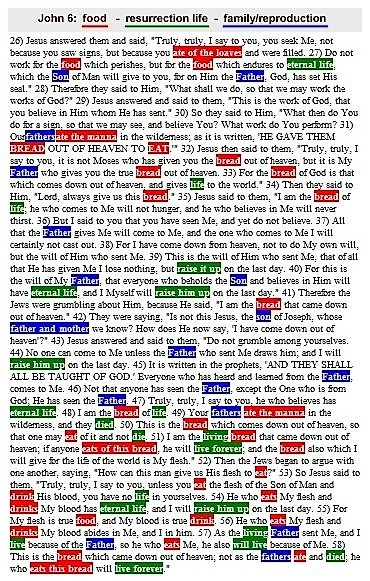
If you equate the tree of life with the bread of life you have another way of considering the activity in the Garden.
Let's consider why the metaphor of eating is used. When you eat something, it's subsequently digested and something of it's assimilated. It becomes part of your body, of you, it abides in you.
Now, beyond the food metaphor I want you to make note of the family relationship theme in the context. When you read the whole context while looking for it you become aware of the frequent and rather conspicuous reference to family relationship.There's a weaving back and forth through the bread of life eating and the father and son themes. This is what we call a clue. :) To illustrate this I've color-coded a passage to highlight three interwoven themes; eating food, the family relationship and life.
The very profound truth hidden here is that food is to the eater like a father is to a son. Something of food is imparted to the eater, which becomes part of them. Something of a father is imparted to the son, which becomes part of them. Get it? Genetic material is transferred from father to son as nutrients are transferred from food to eater. Read the context again with this understanding. Natural food relates to physical life. The genetic material "food" relates here to eternal life! The natural eating involves putting things in your mouth and chewing them up. The other kind of eating is procreative.
The Jews who were grumbling in verses 41 and 42 were at least in the right ballpark with their reasonings, which again, appears for our benefit as a clue.
In the Garden, Eve saw that the tree was good for food.
Any tree that might be seen as desirable to make one wise is no ordinary kind like we might encounter in a walk through an orchard. A tree that might be seen as "good for food" does not necessarily mean it's expected to provide a meal. Remember, in the language of John 6 the eating of food equates to procreation, to sexual reproduction. I submit to you that this action of taking the fruit of the tree of knowledge of good and evil and eating it is no different. Folks misunderstood John 6. Could it be that Genesis 3 is misunderstood for the same reason? The truth is cloaked in figurative language, yet, it's not beyond discovery!
The seed of a tree is in the fruit. When you eat the fruit, you eat the seed. Trees are reproduced by way of their fruit. Let this sink in. The activity in the Garden was procreative. The notable feature of a tree is that it has seed in itself, reproducing after its kind!
The "Tree" - A Metaphor
If you do word studies on "grass" and "tree" you find both are used metaphorically. Grass sometimes represents men, emphasizing the frailty and relative brevity of this life of the flesh. The grass is "tender," you see. A primary feature of the tree metaphor is the reproductive capability, as also indicated in the account of creation. Trees reference either men or heavenly beings or an entire family in figurative usage in the Bible and in apocryphal and extra-biblical literature.
There's a saying you may find familiar: "The acorn (or, apple) doesn't fall far from the tree." It's an observation that a person is like their parents, usually their Dad. It compares to the expression: "Like father, like son." Have you ever heard of a "Family Tree"? You'll be thinking along these lines as you review some examples of figurative usage from the Bible.
If you don't understand about a eunuch, look it up.
From these examples you should understand that when you read in the Bible about trees and their fruit or leaves the reference may actually be to men or heavenly beings and their offspring, or, their procreative ability. I'll present one last example of this class of figures, one that relates specifically to the trees in the Garden of Eden.
Now, we've got a foundation on which to build towards discovering who fathered Cain. If we interpret the description of the activity in the Garden according to those same principles we have an intriguing alternative to consider!
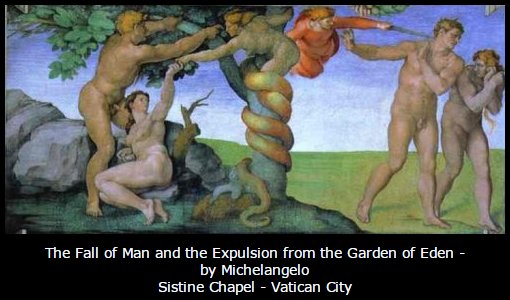
The Tree of Life is the Bread of Life, Y'shua, whose name will be called "Eternal Father" or "Father of Eternity" according to Isaiah 9:6. What, or, who, is the other tree of note in the midst of the Garden? Could it be that the tree of knowledge of good and evil is the reproductive aspect of the serpent being?
Are you grasping how there's a legitimate interpretation that doesn't involve people picking an apple-like object from a tree, putting it in their mouths, chewing and swallowing? Keep what Y'shua taught in John 6 in mind. The food that is the fruit of the tree is a father's genetic material. To eat the fruit of a tree is to receive the father's seed.
In many artistic renderings of the scene in the Garden, the serpent is pictured winding around the tree of knowledge of good and evil like a helical strand of DNA. These images are inspired from somewhere, are they not? While any artistic rendering of a scene carries no authority of itself, images may present lies and they may also conceal and reveal truths.
Have you ever given thought to how the language of the procreative act between Adam and Eve is similar to the descriptive reference to this tree? This is the tree of "knowledge" of good and evil. Adam "knew" Eve his wife. (Genesis 4:1) The Hebrew words rendered "knowledge" and "knew" are different, but the meanings as interpreted are valid and the point I'm making is no technical stretch. Think, "tree of carnal knowledge of good and evil." Of course, there's no proof of Cain's paternity here, but we can consider these elements as potential clues.
The Sex Orgy Version
Now, with an awareness of some relevant figurative language let's reconsider the activity in the Garden as more of a sex orgy than a light snack. Sex orgy? Yes. It's time to put aside our naivete. Satan is bad. We need to see things for what they are, with no whitewashing, no cover-up. I'm assuming here that we're mature adults. I'm not going to buffer you from the truth, even though the truth is hard to accept. I'll present the scenario as revealed to me. Then I'll lead you through the consequences of the sin as they relate to the nature of the sin.
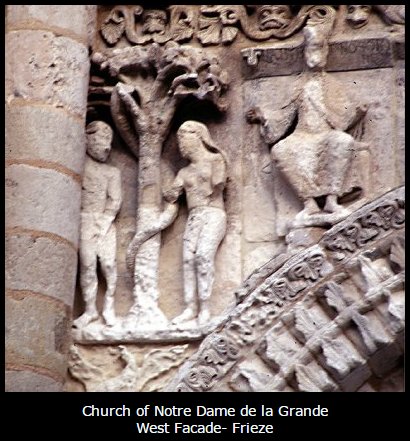
Eve was seduced by the serpent. Their interaction was sexual and it resulted in conception. Adam wasn't deceived yet he was persuaded to join in. He was stimulated to the point of ejaculation with the result that he "spilled his seed" on the ground. When Adam later "knew," or, had sexual intercourse with Eve, she conceived again. The woman was already impregnated by the serpent when she was impregnated by Adam. Her condition is described today as heteropaternal, where a woman is pregnant with children of different fathers at the same time.
There you have it. That's my view. If you sift through the extra-biblical writings you'll discover the testimony of daughters born at the same time as Cain and Abel. Is it too hard to believe that folks who could live for nearly a millennium could bear what we might consider as litters of offspring? Twins and multiple births were the norm in the beginning, if we accept the testimony of the ancient witnesses. Evidence suggests that Eve might have delivered 4 or 5 children in the first birthing experience.
Have I proven anything, yet? No. And, really, I won't be proving anything. You may believe what you want about what happened in the Garden. If Cain was conceived in the Garden with the serpent we have valuable answers to important questions about biblical history and logical explanations for the present, and future; matters that remain unsolved mysteries if we reject the probability of Cain being the serpent's offspring.
Weighing the Options
Let's consider the sin and what happened afterward.
So, is the next verse consistent with either the traditional "light snack" version or the more adult "sex orgy" version I proposed?
Loin coverings? If this is still difficult, you're not really engaged, here. Take a little break. Splash some cold water in your face. Get some coffee or tea and come on back with your thinking cap on. If what happened in the Garden was the "light snack" version, covering the loins makes no sense at all. If the activity was procreative, the part of the body you'd want to hide is where the reproductive organs are located, the loins.
Let's consider the consequences of the sin and whether they're consistent with either the "light snack" or "sex orgy" version. As I mentioned earlier, we may expect justice to be executed on the basis of the "eye for an eye" principle. This is the Creator's way.
The penalty must be commensurate, comparable in nature and severity with whatever incurred the penalty. As it is often said, the punishment fits the crime.
The Lord God addresses the serpent
Does the judgment for what was done in the Garden reflect the nature of the crime? How is it with cattle and the beasts of the field? A bull sees a cow and says, "Hubba hubba, baby. Here's a really tasty apple for you." No, that's not how it works. Cattle and beasts of the field follow their base animal instinct to mate, fulfilling their lust without much consideration for anything else. The serpent acted like a beast with Eve and Adam. Does this suggest either the "light snack" or "sex orgy" version?
Vigeland Park, Oslo, Norway
Scenes of the Garden of Eden?
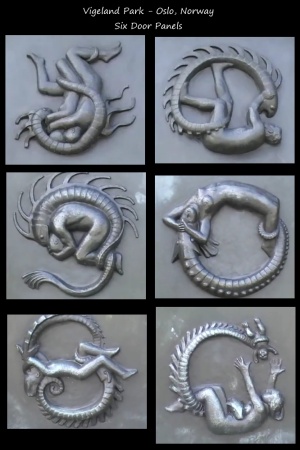
Click to see larger images of the upper or the lower.
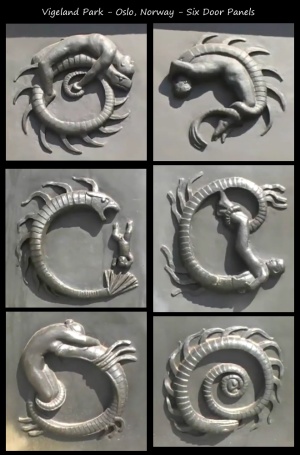
See it in this video!![]() Vigeland Park - Garden of Eden
Vigeland Park - Garden of Eden
As for the serpent going on his belly, think about a reversal of roles, of the positions assumed during the sinful activity in the Garden. I know, disgusting. It's absolutely shocking, revolting. What used to be called common decency dictates that we don't even allow our thoughts to go there. I was appalled when the Lord began opening my eyes to the reality of what happened. The devil is bad.
If you're not yet following along with real clarity, hang in there - it get's more plain pretty shortly.
The next verse is one many of us have heard lots of teaching about, what some refer to as the protoevangelium.
Let's consider the first element of the Lord God's response, the enmity between the serpent and woman. If we reason with a "tooth for tooth" rationale, a consequence relating to the nature of the relationship the serpent would henceforth have with the woman implies that the causative offense relates to the nature of the relationship the serpent previously had with her. Is this making sense? The word "enmity" means "hatred" or "hostility." What kind of offense is suggested in contrast? Here's a list of antonyms for "enmity": "love, friendship, affection, harmony, warmth, goodwill, friendliness, amity, cordiality, geniality" Is there a hint of association with either "light snack" or "sex orgy" versions? Perhaps the serpent was just being the nice guy, a cordial ambassador of goodwill like the official Garden of Eden "Welcome Wagon" rep when he beguiled Eve, offering her a shiny red magical apple? No, that just doesn't work. He was lying, deceiving, laying a snare for her. Friends don't do that. What if his relationship towards Eve (because this is his consequence, not Eve's) was more extreme, more passionate. Certainly, hostility and hatred can be intensely passionate, right? We must add to the list of relationship words the more extreme "lust" and "passionate desire." Now we can begin to perceive some judicial logic in the consequence. According to certain legends of the Jews, Lucifer lusted after Eve. He coveted her for his own. The judgment that is the enmity between the serpent and the woman speaks to this probability. With such an understanding as this, we have a validating continuity when later we find testimony about the sons of god lusting after and taking the daughters of men to wife. The "apple" does not fall far from the Tree. But let's not get ahead of ourselves.
Many see in this a messianic prophecy that will play out until what is written in Revelation 20:10 is fulfilled and the devil is thrown into the lake of fire and brimstone. We see in the context how this seed of hers is immediately linked to the "he" of the bruisings. We perceive in it a prophecy about a conception that occurred when a young virgin of the lineage of Judah was accepting of being overshadowed by the Holy Spirit and who subsequently brought forth the Messiah. We perceive the bruising of His heel as a betrayal, beating and then a crucifixion on a hillside East of Jerusalem. We understand the enmity as existing between the antichrist and Christ. This is very profound, yet, more is implied!
While the brains of those of us schooled in Babylon might habitually snap into auto-pilot and fly something resembling the pattern I just described, let's focus our attention on the matter of "your seed." This address to the serpent in response to what had just happened in the Garden pertains to his seed. If we restrain ourselves from making the big theological leap into the future and consider the context we leave when we make that jump we find ourselves seeing the matter in a light we may never have seen before. Serpent seed? Why bring the matter of seed up to the serpent if all he had done is trick the woman and man into disobedience with a light snack from a forbidden tree? How does that make sense? Should this make sense? I think so! It does if the activity in the Garden was procreative because the figurative usage of seed is about progeny, and progeny is brought forth by acts of procreation! The serpent's seed is mentioned because he had just sired offspring with the woman and this horrific situation was being addressed. This makes sense.
The implication is that the woman was pregnant. While carrying the serpent's seed, she conceived again, with Adam. In due season these children were delivered, Cain first then Abel, and daughters too. There was enmity between the serpent's seed, Cain, and the woman's seed, Abel, as promised. The enmity or hatred was so passionate that Cain murdered Abel.
Cain was a murderer like his father. Adam was not a murderer. Like Father like son. The "apple" doesn't fall far from the tree. The serpent/tree lied in the Garden. "You shall not surely die," he said. The father of lies lied in the Garden to the woman and he fathered in the Garden with the woman. I can't prove it. You can't disprove it. I'm convinced of it.
 HD Video
HD Video mp3 Audio Download
mp3 Audio Download